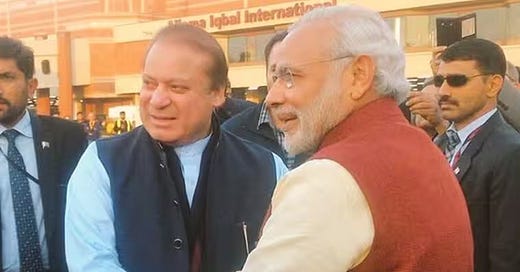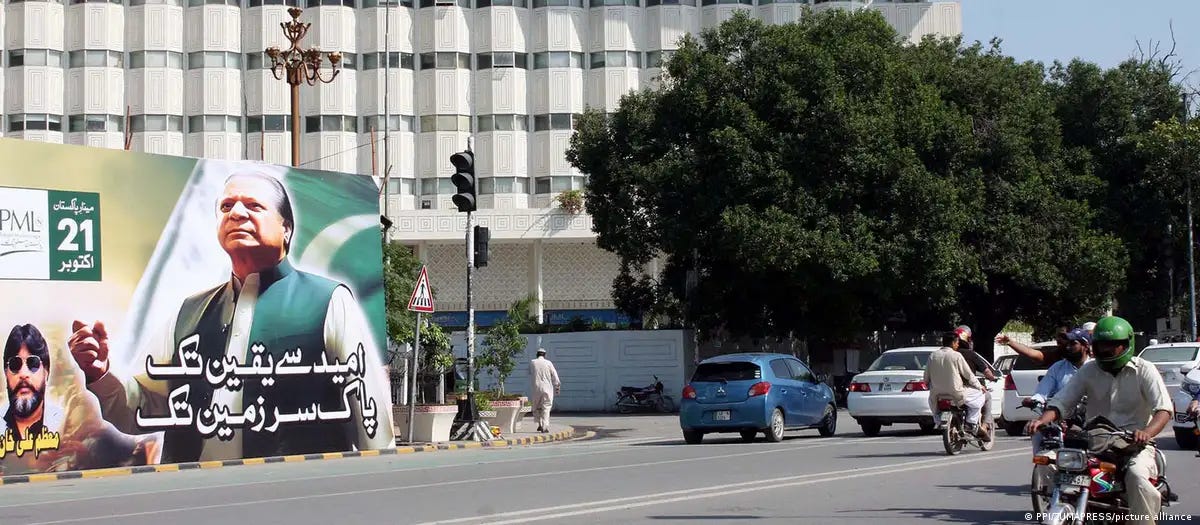Sharif "Badmash" Returns Back to Lahore
Pakistan’s Ex-Prime Minister Nawaz Sharif's Return: Implications for India and South Asia
The Return of Nawaz Sharif: A Significant Event in Pakistan
The return of Nawaz Sharif, Pakistan's three-time former Prime Minister, to a tumultuous reception in Lahore last evening after four years of self-imposed exile in London is an event of considerable import. Occurring merely months ahead of Pakistan's general elections, scheduled for January under a caretaker government, this pivotal moment has profound implications for both Pakistan and its relations with India—casting a long shadow over the geopolitics of the South Asian region.
Context and Historical Perspective
Nawaz Sharif's political career has been punctuated by several challenges—charges of corruption, periods of exile, and a complex relationship with the Pakistani military establishment. However, his decision to return signals a significant moment in Pakistani politics. This comes at a time when his chief opponent, Imran Khan, undisputed leader of PTI (Pakistan Tehreek-e-Insaf), faces incarceration over allegations of leaking state secrets, which many see as politically motivated. Sharif’s return could drastically recalibrate Pakistan's political balance of power ahead of the general elections.
Political Implications for Pakistan
In Pakistan's delicately poised civil-military relations, Sharif's return is tantamount to dropping a proverbial stone in a pond. His Party, the Pakistan Muslim League-Nawaz (PML-N), has historically been at loggerheads with the Pak Army. Sharif's previous term saw allegations of military interference, leading to a “judicial” ouster. If PML-N gains substantial electoral ground, we might witness renewed clashes between civilian and military authorities, an affair that could further polarise Pakistan's already fractured political landscape.
Sibling Rivalry and Rising Stars: A Subplot in Pakistan's Political Theatre
While Nawaz Sharif's return to Pakistan has been met with much jubilation, it introduces a particularly intricate dynamic within his own party, the Pakistan Muslim League (Nawaz), or PML-N. His younger brother, Shehbaz Sharif, the immediate past Prime Minister, has been helming the party in his absence. Adding another layer to this complex interplay is Nawaz Sharif's daughter, Mariam, whose political ambitions are no secret. Although it may not escalate into a full-blown fratricidal conflict, the competition for influence among the two brothers and now Mariam, within the same political space, is certain to create tension and dissension. This internecine rivalry has the potential to weaken the PML-N's unified front, particularly as the party readies itself for the forthcoming general elections.
Implications for India
For India, the ever-changing political dynamics in Pakistan are of immense importance. Sharif has shown both belligerence and conciliation towards India during his various tenures. While he initiated the Lahore Declaration aimed at peace, his Government was also in power during the Kargil conflict. Consequently, India's stance is bound to be cautiously optimistic. Any shift in Pakistan's political landscape could herald changes in the countries' bilateral relations, impacting issues such as cross-border terrorism, trade relations, and the longstanding Kashmir issue.
Regional and Global Dynamics
Sharif's return also coincides with a period of substantial geopolitical flux in South Asia. Afghanistan's uncertain future, China's growing influence, and America's strategic interests in the region add layers of complexity. Sharif’s political resurrection could shift alignments and compel regional actors to recalibrate their strategies. Countries like the United States and China, vested in Pakistan's stability, will be eyeing the unfolding events with keen interest.
Looking ahead— with cautious optimism
Observers have often noted that Pakistan's journey through the years has been that of a quasi-democracy, significantly shaped by military interventions. As both India and Pakistan inch closer to their respective elections, the traditional sabre-rattling, particularly concerning issues like Jammu and Kashmir, is expected to intensify. The political significance of these regions often serves as a pretext for military establishments, especially in Pakistan, to involve themselves in civil governance.
Despite the promise that a democratically elected government in Pakistan might bring, expectations of a radical transformation in Indo-Pak relations should remain tempered. There could be an uptick in ISI-led activities in sensitive areas like Jammu and Kashmir and Punjab, requiring India to be on high alert. In a nutshell, the political chessboard may change, but the game itself remains much the same.








Old wine in new bottle. 2023 is really old 2018 only the change is casting from Imran to Nawaj. Hybrid regime will continue . A politician escapes to Saudi Arabia or London when time to show the strength of spine . Very sad state of affairs next door. A country controlled and governed by corrupt Army and corrupt Elite landlords can hardly be expected to stand on its feet in the forceable future. I hope and pray I am wrong.